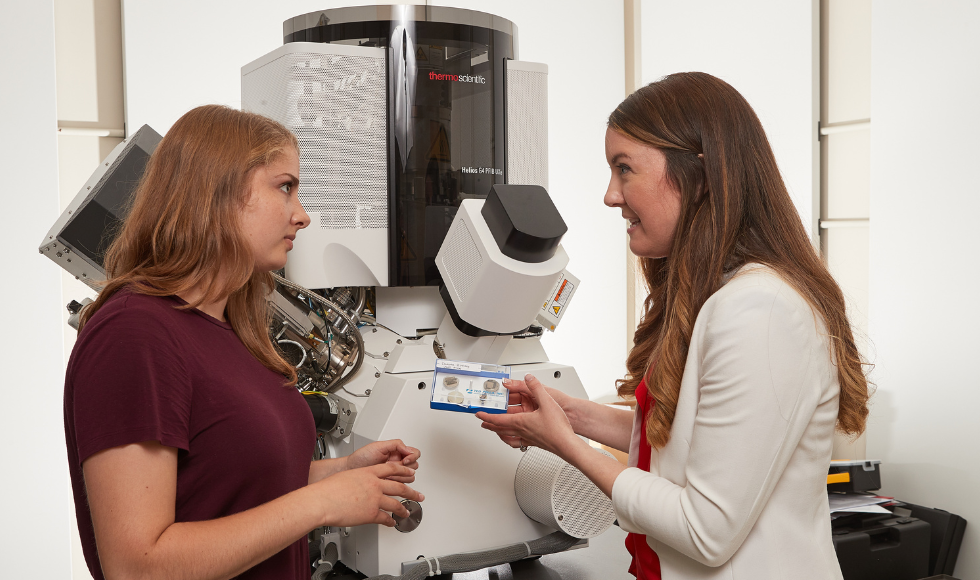McMaster researchers receive $3.2 million in New Frontiers in Research Fund grants

Kathryn Grandfield, right, and a student at the Canadian Centre for Electron Microscopy. Grandfield is one of eight researchers to receive funding from the Government of Canada’s New Frontiers in Research Fund.
BY Daniella Fiorentino, Office of the VP Research
June 4, 2024
Eight McMaster researchers have been awarded a combined $3.2 million from the Government of Canada to advance research across a number of disciplines.
The investment comes from the New Frontiers in Research Fund. Seven researchers have been awarded Exploration grants, and one has received funding through an international call for climate change adaptation and mitigation research.
“Our researchers’ success in this competition shows the promise their work holds to address pressing environmental challenges and advance the health and well-being of Canadians,” says Andy Knights, McMaster’s acting vice-president, Research.
“I commend the government for these timely and strategic investments in Canada’s research and innovation leaders and congratulate our researchers on this well-deserved support.”
The competition results were formally announced on June 3 by Marie-Claude Bibeau, minister of National Revenue, at Carleton University in Ottawa.
“Climate change and its various economic and social impacts are observed globally,” Bibeau said.
“By supporting game-changing interdisciplinary research and fostering international collaboration for innovative projects, our government is committed to finding innovative solutions that could have a significant impact on some of the world’s most vulnerable populations.”
International Joint Initiative for Research in Climate Change Adaptation and Mitigation
This international joint initiative represents a collaboration among research funders from Brazil, Canada, Germany, Norway, South Africa, Switzerland, the United Kingdom and the United States.
The initiative was created to further the design and implementation of co-produced adaptation and mitigation strategies for groups most impacted by the effects of climate change, owing to both physical vulnerability and socioeconomic vulnerability.
Gail Krantzberg, Faculty of Engineering | Climate Adaptation and Resilience Strategies (CLARS): Socio-Economic Vulnerabilities among Urban Migrants in the Lake Victoria Basin and Great Lakes Region
The impacts of climate change on human mobility are expected to be enormous. New waves of migration to climate resilient ‘hotspots’ are impacting pre-existing socio-economic vulnerabilities, and precipitating hardships and unequal outcomes for individuals and households resettling to these areas.
Krantzberg was awarded $1.5 million to lead a project that will explore, design, and recommend co-produced climate adaptation strategies. The project aims to reduce socioeconomic vulnerabilities and build resilience for vulnerable climate migrants and host communities across five cities in the Lake Victoria Basin in Africa and the Great Lakes Region in North America: Kampala, Mwanza, Eldoret, Detroit and Hamilton.
The CLARS team will engage key stakeholders, including migrants and host communities, to generate detailed locally coproduced knowledge and data, and develop strategies and policies that can help communities proactively prepare and plan for climate-induced movements.
NFRF Exploration Awards
The NFRF Exploration grants support initiatives that push boundaries in exciting new areas and inspire high-risk, high-reward interdisciplinary research. Each researcher will receive up to $250,000 over the next two years.
• Wael El-Dakhakni, Faculty of Engineering | Constrained Spectral Clustering-guided Controlled Islanding: A Radical Approach to Canada’s Wildfire Risk Management in the Age of Climate Change
• Kathryn Grandfield, Faculty of Engineering | Engineering Strategies for near-atomic protein mapping on biomaterials
• Sharon Kaasalainen, Faculty of Health Sciences | Challenging the Status Quo: Implementing Green Care Farms in Canada to Enhance Quality of Life for Persons with Dementia
• Zahra Motamed, Faculty of Engineering | Development of a novel advanced low-cost non-invasive tool operated by non-experts for large-scale cardiovascular health diagnosis
• Ashirbani Saha, Faculty of Health Sciences | Towards Trustworthy AI that Aids Radiologists in Mammogram Analysis: An Interdisciplinary Approach using AI, Healthcare Data Science, and Ethics in Technology
• John Whitney, Faculty of Health Sciences | Development of a machine learning approach for the discovery of antimicrobial proteins
• Samantha Wilson, Faculty of Health Sciences | Investigating oxidative stress and cellular function as biomarkers of preeclampsia subtypes using placenta-on-a-chip


